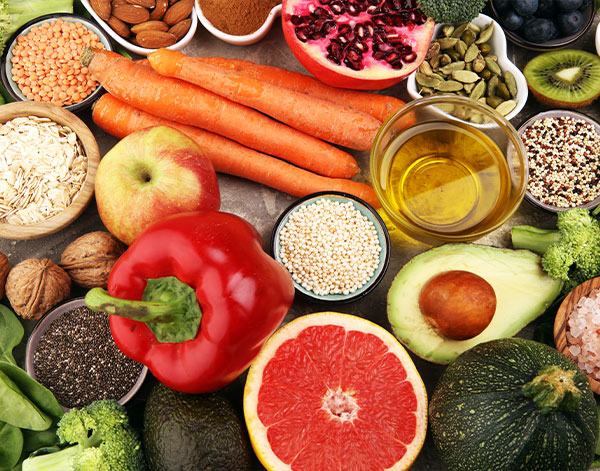Can’t Do No. 2? Try These Natural Remedies for Constipation
Not everyone has stool softeners on hand, or wants to take them for days. If you frequently find it hard to go, these natural remedies for constipation will help.

If you’re unsure how many No. 2’s are the right number for you to be “regular,” just remember the rule of three.
Three, as in up to three bowel movements a day or as few as three a week. Either is normal, as long as you feel OK. If you go No. 2 fewer than three times a week, however, you likely are constipated.
And you are among good company. At least 2.5 million people visit a doctor every year for constipation treatment, of which there are many options. But you might not need a drug or procedure to ease your constipation. A holistic approach might do the trick.
The natural remedies for constipation in this blog can help you figure out if you’re experiencing temporary irregularity or the symptoms of an underlying health issue in your gut – or even gallbladder.
Constipation Explained: A Natural Condition With Hard Truths
There’s a timely reason to consider natural remedies for constipation now: February is Gallbladder Cancer and Bile Duct Cancer Awareness Month.
What’s the connection? The gallbladder releases bile, a thick fluid produced by the liver, into the intestines to aid digestion. Disruption of the bile can cause constipation – when the waste in your digestive system moves too slowly and becomes dry and hard.
Constipation also might result from your diet and lifestyle behaviors, or be the side effect of certain medications, including narcotics (painkillers). Other conditions, including pregnancy, weak pelvic muscles, and irritable bowel syndrome, can cause it as well.
Constipation is considered chronic when it persists for a few months. Symptoms include:
- Fewer and difficult bowel movements.
- Straining hard to go, which could lead to hemorrhoids (inflamed veins in the rectum).
- Small and/or hard stools.
- Incomplete movements (feeling you still have to go but can’t).
- Sensing that your rectum is blocked.
Some Natural Remedies for Constipation
If you experience occasional constipation, these natural remedies can help:
1. Eat less “cellophane” foods – Make an effort to replace high-fat and highly processed foods with whole fruits (especially seeded fruits like berries), vegetables, lean proteins, whole grains, and other high-fiber foods. The heaviness of these foods make for faster-moving waste. Tip: Try avocado on your sandwich instead of cheese. Sprinkle bran in soup and add strawberries to yogurt.
2. Drink more water – Dehydration can cause your feces to become dry and hard, slowing it down. Specialists advise women get nine cups of fluid daily and men get 13 for healthy digestion. The good news is this amount includes the fluids in foods. In terms of what you pour, try to make the majority water. Tip: Coffee and alcohol are diuretics, so keep them moderate.
3. Work your digestive muscles – When you exercise, your stool moves more quickly through the large intestine so your body absorbs less water from it, making it softer. Aerobic exercise in particular stimulates and strengthens the digestive muscles so they can better contract. Tip: Wait an hour after eating before exercising so your blood can flow to your gut and help you digest first.
4. Ease your brain – Depression and stress may trigger or aggravate constipation, due to the relationship between your digestion and brain called gut-brain axis. For example, stress can cause your body to release hormones that can slow down and inflame the intestines. Tip: If you notice a link between your mood and irregularity, try stretching exercises or yoga, meditation, or engaging in relaxing activities that make you happy.
5. Massage your belly – Your gut muscles support your intestines, so if you rub and knead these muscles they may relax enough to improve regularity. Studies find that abdominal massage can trigger muscle contraction, ease pain, and guide waste through your system more quickly. Tip: Learn abdominal massage techniques from WebMD here.
6. Get more Z’s – Researchers have linked sleep deficiency with an increased risk of constipation. If you’re having trouble falling asleep or staying asleep, diet and exercise can help. Also try to get into bed earlier. Tip: Once in bed, turn off all screens. Blue light from screens is shown to disrupt sleep.
For the most benefit, practice these natural remedies even after your constipation passes. They should help maintain normal digestion.
If Natural Remedies for Constipation Need an Assist
If your constipation persists for several months after trying these practices, you might be experiencing an underlying issue that needs medical attention.
If your gallbladder isn’t storing enough bile, for example, or if something such as a stone is blocking its flow, you could experience constipation. A tumor or colorectal cancer also can cause changes in bowel movements by blocking your stool.
Symptoms includes:
- Abdominal pain, cramping, and bloating.
- Nausea.
- Discomfort after eating (indigestion).
- Blood in the stool.
What to Expect If You Need Medical Treatment
If you experience symptoms of constipation that persist, it may be time to call a doctor to diagnose a potential underlying illness through a blood, urine, or feces test. Your doctor also might take X-rays or view your colon using a slim scope with a camera.
Treatments for constipation may depend on the cause. Medications might be prescribed to reverse the side effects of other drugs, for example. In severe cases, you may require surgery to remove the blockage.
Your doctor can work with you on the most appropriate treatment, including the above natural remedies for constipation. In time, you can make No. 2 a regular part of your life.
Still have questions? Learn more about chronic constipation on our blog by Dr. Gregory Lam or read about the gallbladder on our conditions website. If you’d like to speak to a specialist, contact us to request an appointment for a consultation online.

